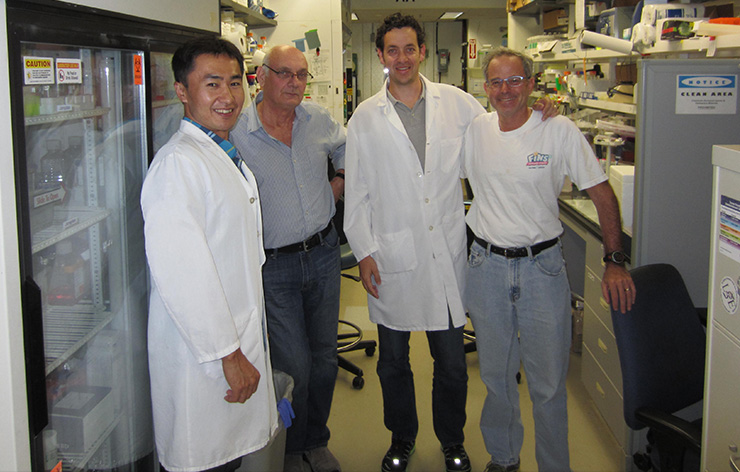A Word From Our Latest Rabin Medical Exchange Visiting Fellow: Dr. Nadav Sahar

Dr. Nadav Sahar
Our latest Rabin Medical Exchange Visiting Fellow at the University of California San Diego’s Gastroenterology Department, Dr. Nadav Sahar took a moment to chat with us. Dr. Sahar and AFRMC would like to thank Al & Claude Mann for their full support to make this visiting Rabin Fellowship a reality.
Here is what our Rabin Fellow, Dr. Sahar had to say:
- Please provide an overview of your fellowship at your hospital and the role you played during your stay.
I spent a month at the University of California San Diego (UCSD) campus. During this time I worked at the laboratory of Dr. Eyal Raz, a world renowned scientist in the field of immunology. I learned mostly about diverse and complex mice models dealing with colitis. Being a gastroenterologist, I also took part in academic activities of the division of gastroenterology of UCSD headed by Dr. William Sandborn, mainly at the VA Medical Center and Thornton Hospital. - Describe how your fellowship opportunity has expanded your knowledge in your specific field.
This was an unbelievable exposure to basic science and precise state of the art lab work. Models we have in mice provide solutions for major difficulties we have in clinical gastroenterology, one example being colitis. The scientists I have been fortunate to collaborate with, mainly Dr. Raz, were an outstanding example of innovation which never ceases to amaze and provides the medical world with new ideas and ways of overcoming - What did you enjoy most about your fellowship opportunity?
I mostly enjoyed meeting inspiring doctors and scientists and being able to work hands-on in the lab, something I have not been able to do for a long time, unfortunately. Meeting people such as Dr. Raz and Dr. Sandborn, a worldwide leader in the field of inflammatory bowel diseases, has been a true honor. - What were some of the challenges you faced while working at your hospital?
The main challenge was becoming familiar again with routine lab work and complicated experiment protocols. Each experiment demands the highest precision and concentration from the working scientist on diminutive details. The approach in clinical life seems more “natural”, perhaps because I have been practicing it for many years. - Do you feel international medical relationships and fellowship programs are vital to the future of medicine and research?
I cannot emphasize enough the importance of fellowships abroad and collaborative work to shape one into becoming a better doctor and researcher. By doing so, we are exposed to things that we are not able to learn in any other matter. These exposures are critical in my mind for improvement in my field and being up-to-date with the latest developments. - Explain the major differences between the Israeli health care system and the United States private healthcare systems in terms of your specific field.
The main difference I noticed between the two health care systems has to do with the medical treatment offered to patients based on his/her financial capabilities/insurance. Treatment seems to be offered to larger sectors of the population in Israel, regardless of their socioeconomic status. This is not the case in the US, where certain treatments might not be available for patients if he/she cannot be covered by his/her insurance. - What do you feel are the key issues and challenges in your field – not only in the Unites States and Israel, but worldwide?
The key challenges in the field of gastroenterology are improving our cancer prevention options for stomach and esophageal cancer, as we have done for colon cancer. Also, we are in need in more treatment options for patients suffering from inflammatory bowel diseases. - What are your future plans at Rabin Medical Center when you return to Israel?
I am planned to finish my residency in gastroenterology at the end of this year. From there, I am considering continuing for a post-doc fellowship to continue basic science research. - Would you recommend this fellowship to your peers? Why or why not?
I would strongly recommend this fellowship to all of my colleagues! This has probably been one of the highlights of my residency and has given me the opportunity to see new aspects of my work I was not aware of before. Furthermore, the chance to meet fellow doctors abroad can lead to great future collaborations.
SPECIAL THANK YOU TO THE AMERICAN FRIENDS OF RABIN MEDICAL CENTER AND SUPPORTERS OF THE RABIN MEDICAL EXCHANGE FELLOWSHIP PROGRAM. PLEASE SUPPORT THE RABIN FELLOW PROGRAM TODAY TO CONTINUE THIS ONCE IN A LIFETIME OPPORTUNITY FOR FUTURE RABIN MEDICAL EXCHANGE FELLOWS! YOU CAN SPONSOR A RABIN FELLOW FOR $5,000!
Related Articles
Expanding Knowledge Through the Rabin Medical Exchange Fellowship
With plans to become a cataract surgeon, Ruti Sella focuses in cornea, cataract and refractive surgery at Israel’s Rabin Medical Center. Ruti Sella is part of an ever evolving field, which combines complex surgical challenges that utilize cutting edge new technologies and growing demand of microsurgical techniques.
Rabin Medical Exchange Fellow Dr. Leor Perl
Dr. Leor Perl, from Rabin Medical Center’s Cardiology Department, came to Stanford University’s Stanford Hospital & Clinics in March 2014 to complete a month-long Rabin Medical Exchange Fellowship in cardiology, under Dr. Alan Yeung, Director of Interventional Cardiology at Stanford’s School of Medicine.
Study at Rabin Medical Center On Induced Labor Shows No Harm to Mothers & Babies
Tel Aviv University study has determined that natural, spontaneous deliveries and induced deliveries following the rupture of the amniotic sac in the mother share similar neonatal outcomes, contradicting common wisdom.